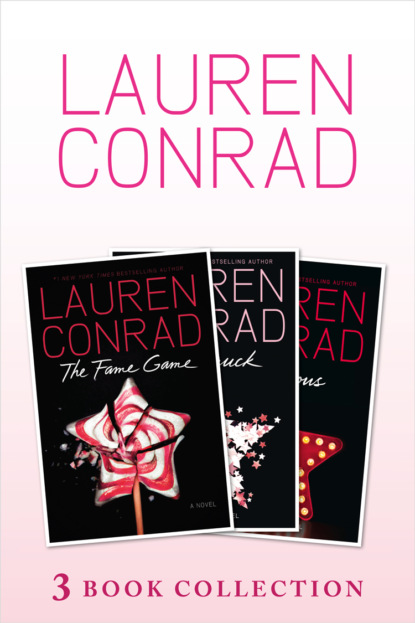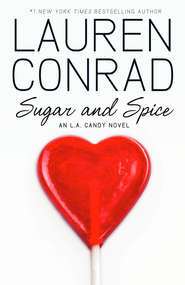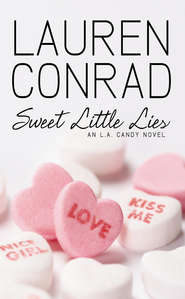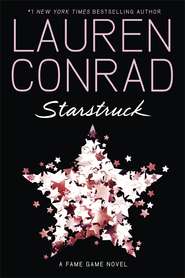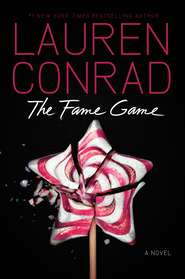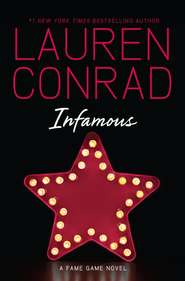По всем вопросам обращайтесь на: info@litportal.ru
(©) 2003-2024.
✖
The Fame Game, Starstruck, Infamous: 3 book Collection
Настройки чтения
Размер шрифта
Высота строк
Поля
“How funny,” Madison said. But it wasn’t actually funny. Because she still had Bitsy in her apartment, tucked in the back of her sock drawer. She hadn’t remembered who’d given her the thing; she only knew that the unicorn was one of the few possessions she took with her when she left Armor Falls. Most of her memories of home were bad, but somehow some old good feelings had been attached to that cheap, made-in-China unicorn. And now she understood why.
She was torn between wanting to hug Charlie and to hit him in the face. (Which would Trevor like more? The punch, probably.) She had loved that unicorn instinctively because it was all she had of her father. Her heart felt tight in her chest.
“Bitsy probably ended up in the Dumpster years ago,” Charlie said. “Well, she was your best friend for a long time.”
My only friend, thought Madison bitterly. What a joke her life had been! She’d had a drunk for a mother, a convict for a father, a headcase for a sister, and a stuffed animal for a best friend.
But now she was Madison Parker, star of three (well, it’d be three soon enough) hit TV shows. Here on the Santa Monica Pier, amid the bustle of tourists and the stink of fried food, she straightened her spine and tossed her hair back. Thank God things were different now.
“So, it’s been great,” she said, “but I should really—”
“I thought if I left, then things would get better,” Charlie said, as if they were in the middle of discussing a topic neither of them had even gone near today. The sun was in his eyes and he squinted at her. It made him look much older than his forty-two years.
“Well, they didn’t,” Madison said coldly.
Sophie, who had briefly vanished, reappeared with a giant snow cone. “Yeah, Dad, it was bad.” She shook her head as if lost in a horrible childhood memory. “Really bad.” She didn’t seem angry so much as baffled. Maybe that was part of her new goddess-of-love trip: She wouldn’t blame him for leaving them with a mother who drank Wild Irish Rose for breakfast and whose best efforts in the dinner arena amounted to a few slices of wet ham on sale-rack Wonder Bread.
Well, Madison wasn’t Sophie. She was pissed. Her mother couldn’t even keep a jar of mayonnaise in the fridge for the awful sandwiches! So what if she hadn’t realized how much she missed her father until right this very moment—it didn’t matter. She was still furious.
“I’m so sorry,” Charlie whispered. “I tried to explain in my letters.”
God, those stupid letters again, Madison thought. As if they mattered, as if they even existed. And if they did? Well, you could have a stack of letters ten feet high and they still didn’t add up to a father.
She turned on her heel and walked to the edge of the pier. Leaning over the railing, she took a long breath of ocean air. Any dad who vanished for a decade and then showed up only after his daughter had made it was obviously in it for the money. Two could play that game, couldn’t they? She, Madison Parker, was in it for the ratings.
Ratings, she whispered. Ratings, ratings, ratings.
It was a mantra that kept her from flinging her mike pack into the Pacific Ocean. It gave her strength to turn back around and smile her megawatt smile.
“So,” she said to her family, “how about that cotton candy?”
Standing in her colossal walk-in closet, Madison brushed her fingertips along the sleeves of her silk tops, arranged by color from deep jewel red to coral, from lime to lavender. Even in her wildest dreams, she’d never imagined a life like this. That she would own these nice things. She’d been an eight-year-old scrubbing her jeans by hand in the kitchen sink because her mother couldn’t be bothered to take them—or anything—to the Laundromat. And now she didn’t have to even touch her dirty clothes: She tossed them into a basket from which they magically disappeared, and days later they reappeared, wrapped in plastic: crisp, fresh, and clean.
Madison didn’t open the dresser toward the back of the room, but she didn’t need to. She knew what was in there, nestled in the top drawer: a soft form, its synthetic fur faded and slightly matted, its horn drooping. She felt silly for keeping it all these years.
But, said a nagging voice in the back of her mind, what if he meant what he said? What if there really were letters? Did that really mean nothing?
Almost without thinking, Madison pulled her BlackBerry from her pocket and punched in her mother’s number. It rang for a long time, and Madison was just about to hang up—probably Sue Beth had lost her phone one night at a bar—when her mother answered.
“Hello?” Sue Beth’s voice sounded weary and old. But not drunk: surprisingly sober.
“Mom?”
“Who is this?”
“It’s Madison.”
“Madison . . . ?” Her mother sounded confused.
“Mom, it’s Madelyn.” She tugged on one of her platinum extensions. It had been years since she had heard her mother’s voice.
“Nice of you to finally call,” Sue Beth said, not unkindly. There was a long pause and Madison knew her mother was taking a drag on a Parliament cigarette. “I’ve seen you on the TV. You look really nice.”
Madison’s heart clutched with that comment. A compliment was not what she’d expected. “I wanted to tell you that we heard from Charlie,” she said. She waited for a response, but none came. “Mom, you still there?”
“I’m here,” her mother said. “What exactly do you want me to say? It’s not nice to speak ill of a girl’s father, even if you think he’s a lying rat bastard.”
“Right,” Madison said. “I just didn’t want you to be surprised when you saw it on TV—when you see him on the show, I mean. I didn’t ask him to come here. He just showed up. Well, after Sophie reunited with him during rehab. You knew Sophie went to rehab, didn’t you?”
Her mother sighed. Or maybe it was just an exhalation of her cigarette. “Yes, Madelyn. I may not have been mother of the year, but I did know that Sophie was in rehab. In fact, I spoke to her several times while she was there.”
“You did?”
“I did,” Sue Beth said.
“Wow, if I’d known the fastest way to get my parents’ attention would be to crash on booze and drugs maybe I would have tried it,” Madison said drily.
“Didn’t figure from the looks of your life that you needed me much anymore,” Sue Beth said. “That why you called then? To tell me you saw your dad?”
“He mentioned something I wanted to ask you about. Some letters.” Madison scrunched her eyebrows together and tilted her head. She wasn’t sure which answer she wanted. “He was lying, right?”
Her mother waited a long time before answering. “No, there are letters.”
“There are? How many?”
“I don’t know. A few dozen, I guess.”
“For me? And for Sophie?”
“For both of you, I think,” Sue Beth said.
“And you didn’t feel like sharing them with us?”
“I didn’t want to give you false hope. That man never did anything right in his whole life. I figured those letters were full of promises he never would’ve kept.”
Madison’s fury at her mother was matched by her surprise. Charlie wasn’t lying. Yes, he’d abandoned her. But he’d tried to stay in touch. He really had. And now he’d come back. He’d finally, after all these years, come back to take care of her.
(#ulink_89edf8bd-c4bd-5b67-a2e7-72bb53a0b033)
Kate was curled on the couch, her guitar in her lap and a mug of green tea steaming on the coffee table in front of her. She hummed quietly to herself as she strummed: E minor, D, A minor, C, E minor—but then what? She was stuck on the bridge. She tried a few chords and then shook her head in frustration. She frowned down at her fingers as if it was their fault.
She considered giving up for the night. Maybe she should bake a batch of cookies or something. Presumably the oven worked—not that she’d ever turned it on. (There were just so many good restaurants in L.A., so many convenient take-out joints. It wasn’t at all like her little suburban slice of Columbus, Ohio, where the dining choices were either Chili’s, the Olive Garden, or the all-you-can-eat Super Buffet.)
She was halfway to the kitchen when she reminded herself that one did not forge a successful music career by baking Nestlé Toll House when times got tough. One persevered. She turned, sighing, and headed back to the couch. E minor, D, A minor, C . . . What was that stupid poster her first guitar teacher used to have on his wall? “Success is 1% inspiration and 99% perspiration”?
She picked up her guitar again but kept stealing glances at her phone. She hadn’t talked to her sister in a few days. Maybe she should call her. Or maybe Luke would call. They’d hung out a lot in the last week, mostly at the little cottage he rented in Venice. They had taken long walks along the water, people-watched on the boardwalk, and watched old Gregory Peck movies. They’d talked and talked, about all sorts of things—but Kate never said a word about PopTV. She had done just as Madison instructed.
E minor, D, A minor, C, E minor, D, A minor, C . . . Ugh, she was going crazy.





